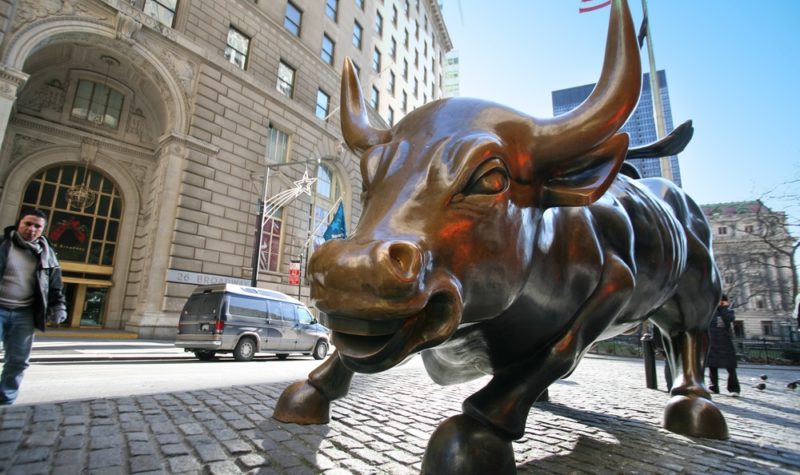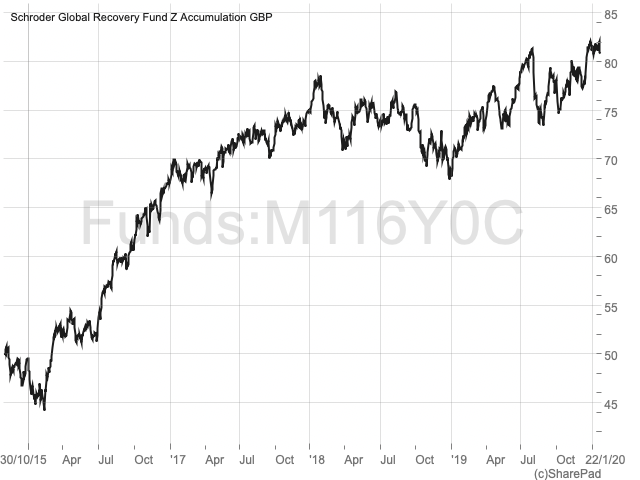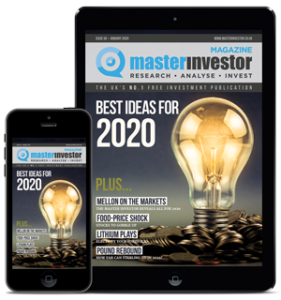The best funds for 2020

| First seen in Master Investor Magazine
Never miss an issue of Master Investor Magazine – sign-up now for free! |
Nick Sudbury unveils the pick of the experts’ best fund and trust ideas for a prosperous 2020.
Despite all the political shenanigans, 2019 turned out to be a positive year for investors, with most of the main stock markets making double-digit gains. It is highly likely that 2020 will also be dominated by global politics, with the EU trade-deal negotiations, the US-China trade war and the US presidential election all having the power to influence returns.
To successfully navigate such a complex year, it is important to think about what threats or opportunities these events offer and then factor in the assets or geographies that represent good value or look expensive.
UK, European, Asian, Japanese and global emerging market equities all look reasonable value, unlike US equities. Bonds, however, are expensive, as despite a recent pull-back there is still $11 trillion of global debt with a negative yield.
It is hard to believe, but a third of world government bonds are negatively yielding, which means that investors actually agree to get back less than they lend. This is an extremely high price to pay for the apparent safety that they offer, and the deal gets even worse once inflation is taken into account.
Ryan Hughes, head of active portfolios at AJ Bell, says that investors need to focus on the policies of the central banks and the yield curve:
“We seem to have moved on from quantitative easing as a financial support mechanism and into a period of fiscal expansion with governments looking to borrow more money and spend it. This could lead to higher inflation and higher bond yields with a steepening of the yield curve, which could have implications for those equities deemed as bond proxies.”
There is a good chance that the major economies will continue to grow, albeit at a slower pace than before, which should be broadly positive for equities. However, if there are any disappointments in the growth figures or corporate revenues, some of the markets are going to look expensive as a recovery is already partly priced in.
The home front
The large Conservative majority in the general election put an end to the risk of a hard-left Labour government and should enable the political paralysis that has been holding back investment in this country to be resolved.
Reflecting on the leeway that the Prime Minister now has, to chart the course of the country, starting with the approval of the withdrawal agreement and EU exit by the end of January, Salman Ahmed, chief investment strategist at Lombard Odier Investment Managers, says:
“More importantly, it makes a move towards the centre possible as the DUP and ERG Brexiteers will now lose power, given the results. We see this result as a very positive outcome for the UK as it raises the likelihood of a soft deal, reduces uncertainty and allows pent-up business investment to take hold, thus driving growth.”
In theory this should mean that there is an endgame in sight for Brexit, which should help domestic stocks to rebound from their current low levels. The pound could also recover some of its lost ground, although there is a lot of hard negotiating ahead as the UK attempts to secure a trade deal with the EU:
“A resolution to Brexit will support the UK market in the short term at least as it means things are moving forward; however, with a deal needing to be completed by the end of the year this optimism could be short lived,” warns Adrian Lowcock, head of personal investing at Willis Owen.
Trump card
The US presidential election is in November, but it will dominate the airwaves throughout 2020 and investors will need to keep a close eye on developments to see whether the Democrats pose a real threat to Trump.
As Hughes says:
“Trade talks between the US and China will also be a big focus with anticipation of some kind of high-level agreement expected rather than an outright deal. We are already seeing the impact of the trade war on the global economy and some kind of resolution seems sensible, but the markets will react to every positive or negative tweet.”
Of course, the whole process could be derailed before then if President Trump is successfully impeached, which would be bad news for the markets. Assuming that he isn’t, he will be keen to avoid a recession and do a trade deal with China. If this happens, it would be positive for global growth.
UK growth funds
Against this backdrop, Darius McDermott, managing director of Chelsea Financial Services, recommends Liontrust Special Situations, where the managers invest in UK companies that have hidden intangible strengths, as he explains:
“Every stock in the portfolio must have intellectual property, a strong distribution network or recurring revenues. Another important factor is how key company employees are motivated, with the preference being for direct ownership of the firm’s equity. The resulting portfolio consists of businesses that can grow their earnings independently of the wider economy.”
The UK stock market is cheap – in fact, the gap between the dividend yield and the yield on gilts is the widest since Queen Victoria’s reign. It is also cheap when looked at on a global basis:
“There are many funds I could pick, but I’m going for Richard Buxton’s Merian UK Alpha fund,” says Ben Yearsley, a director at Shore Financial Planning: “Richard is an excellent long-term manager and his portfolio should benefit from general election and Brexit clarity.”
Another fund that is sensitive to the domestic economy is Merian UK Smaller Companies, which has been recommended by Lowcock. He says that the firm has one of the most highly regarded small and mid-cap teams and that it is headed by Dan Nickols who is the manager of this fund.
Nickols takes a pragmatic approach to valuation that allows growth, value and recovery companies to be held, although the portfolio has tended to show a growth bias. It has £1.1bn of assets under management and has comfortably outperformed its benchmark and sector average over the last five years.
UK income
Alternatively, there is Montanaro UK Income. Hughes says that Montanaro is a specialist smaller companies manager with years of experience of investing in this area. The fund yields around four percent with solid dividend growth prospects and over 60% of the assets are invested in companies bigger than one billion pounds in size.
| First seen in Master Investor Magazine
Never miss an issue of Master Investor Magazine – sign-up now for free! |
Value managers have had a difficult decade since the financial crisis, with falling interest rates favouring their growth counterparts and bond proxies. There have been some early signs that this could be about to change, although it will depend on how the key macroeconomic events pan out.
If there is a rotation back into value, a prime beneficiary would be Man GLG UK Income, which would be a good option for income investors as it doesn’t just allocate assets to the big dividend payers in the index:
“Manager Henry Dixon takes a multi-cap approach and has a value bias, potentially gaining a double boost from a positive resolution to Brexit. The strategy currently yields over 5% and pays monthly dividends,” explains Hughes.
Another option for income seekers is Franklin UK Equity Income, where manager Colin Morton blends the economic outlook of the economy and stock-market dynamics with a valuation-aware approach to company selection:
“Morton focuses on large companies with strong and growing free cash flows, sustainable superior competitive positions in their industries and attractive dividend yields and/or dividend growth. The fund benefits from the valuation discipline with which he applies his stock selection process and his assessment of the economic cycle,” says Lowcock.
Global growth
McDermott expects there to be some progress in the US-China trade war and if that is the case, one area that should do well is Japan:
“Lost in the escalating trade war tensions between China and the US is the fact that the US has trade deals signed or pending with Japan, South Korea, Canada and Mexico – making up four of the US’s top seven trading partners and accounting for a combined 60% of US trade,” he says.
Japan has agreed to a trade deal that would allow more agricultural imports from the US and avoid new tariffs on Japanese cars exported to the States. The Japanese stock market has lagged the S&P 500 in the last few years and is cheap relative to the US. It might therefore present a valuation opportunity.
McDermott’s preferred way to take advantage is T. Rowe Price Japanese Equity, which invests in around 60-100 Japanese companies of all sizes, although with a notable overweight to smaller firms:
“The manager aims to find businesses he believes can deliver sustainable growth before other investors recognise their potential. He will adapt his investing style as needed to suit changing market conditions, which has helped him to outperform in different environments,” he says.
Lowcock suggests Man GLG Japan Core Alpha as an alternative. Manager Stephen Harker is a contrarian investor who looks for companies that are out of favour. He then selects those with strong fundamentals and management where he believes there is the opportunity for a turnaround.
If you would rather have a go-anywhere kind of mandate you could try Miton Global Opportunities, which is available as an investment trust (LON:MIGO) or a fund. It provides exposure to a portfolio of investment trusts that the manager thinks are undervalued or unloved where there is an obvious catalyst for the discount to narrow.
Yearsley says that the average discount to net asset value is 23% and if you pay 77p in the pound for assets and exit at par, you will make 30% on your money without any change in the value of the underlying, although there is obviously no guarantee that this is what will happen. Reflecting further on Miton Global Opportunities, Yearsley points out:
“There has been less interest in smaller investment trusts, which makes this an interesting opportunity. Returns tend to be lumpy and it had a dull year in 2019 so 2020 could be more interesting.”
Global income
If you are mainly interested in income and want a one-stop shop, you could try M&G Episode Income. McDermott says that it is a multi-asset fund that invests directly in individual stocks and bonds, with property funds providing the commercial-property element. The manager uses behavioural finance to find pockets of value and invest against the herd, although the historic yield is a modest 2.2%.
There is a higher payout of 2.9% available from First State Global Listed Infrastructure, which invests in key infrastructure assets and has been a firm favourite of Yearsley’s since it was launched in 2007, as he explains:
“They have a hedged share class as well and I have recently switched my own personal holding into this as it takes currency movements out of the equation, something that could be important if there is a sterling surge after a Brexit resolution.”
Another option would be JPMorgan Emerging Markets Income, where manager Omar Negyal is able to take advantage of the company’s deep research coverage provided by 18 emerging market analysts and 12 China specialists. It has an historic yield of 3.9%:
“This rigorous investment process assesses five-year dividend prospects to uncover quality companies with growing earnings and dividends. Although around 60% of the holdings will have a dividend yield of three to six percent, there is the flexibility to invest in companies with lower yields, but greater potential for dividend growth,” explains Lowcock.
FUND OF THE MONTH
Contrarian investors might want to consider the Schroder Global Recovery fund that applies a deep value approach to stock selection. It was established by managers Nick Kirrage and Kevin Murphy, who have worked together for over 15 years, building an impressive track record, while co-manager Andrew Lyddon was a founding member of the Global Value team in 2013.
Lowcock says that the investment process targets companies that are significantly unloved and undervalued. The fund has a concentrated 42-stock portfolio that includes large positions in companies such as Standard Chartered, Barclays, Centrica and HP Inc:
“The universe is screened to identify companies which meet their criteria then in-depth research is undertaken by supporting analysts to ensure the financial position is tenable and earnings capable of sustained improvement. Despite the value style being out of favour for a long time, the strict disciplines employed have ensured respectable performance and this fund should be well-positioned if and when the value style returns to favour.”
Hughes also sees potential: “The last couple of months have started to show a small turnaround and this certainly has the ability to continue through 2020, particularly if we see a steepening of the yield curve. Valuations of these types of stocks have become very cheap on a PE basis with some solid businesses now sitting on a PE ratio of less than 10.”


Comments (0)